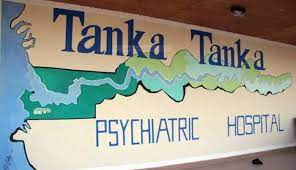By: Ismaila Bah
The only psychiatric hospital in The Gambia for mentally challenged individuals, commonly known as ‘Tanka Tanka,’ revealed that 60% of its admission cases are drug-induced psychosis. Illicit drug intake has become a global phenomenon affecting all sectors irrespective of geographical boundaries. Illicit drug intake ruins the talents and resourcefulness of many young people across the world, thereby making it difficult for victims to realize their goals. The Gambia is no exception to this negative impact of illicit drug abuse, where the youth, accounting for 60% of its population, is also said to be the most affected group in society.
Some of the factors linked to the increasing illicit drug intake across the country are attributed to poor coastal and border patrol, corruption, among others, making The Gambia an ideal transit destination for most drugs. In The Gambia, cannabis is said to be the most problematic drug; however, other drugs such as cocaine, heroin, clonazepam, and bonazepam are also included. These drugs are either in powder, smoke, or liquid form, contributing to the increasing crime rates in the country according to reports. Illicit drug consumption changes one’s mindset; therefore, most of the anti-social behavior and crimes such as theft, robbery, and rape are said to be connected with drugs.
The adverse effects of illicit drug intake at both national and international levels cannot be overstated. Some individuals venture into illicit drug intake due to stress, depression, unemployment, peer influence, and trauma, thereby affecting all sectors.
A senior lecturer at the School of Public Health at Brikama Campus, Sambou L.S Kinteh, highlighted that illicit drug intake damages the kidney, thereby contributing to metabolic disorders. “It causes an imbalance of bodily functions and other metabolic processes such as respiration, heart failure, and liver issues,” Mr. Kinteh added. Based on his expertise, Mr. Kinteh pointed out that the liver is the most affected organ due to its responsibility to detoxify harmful substances from the body. “Detoxification of toxic substances depends on the amount of drugs and duration consumed by an individual,” he added.
Despite advocacy and sensitization campaigns on the dangers of illicit drug intake across the globe, many people still fall victim to illicit drugs. In order to curb this menace, collective responsibility is needed. The Drug Law Enforcement Agency of The Gambia (DLEAG) is expected to work with relevant stakeholders at sea ports and borders. Effective implementation of policies and actions is paramount in contributing toward a drug-free society for national development.
Highlighting some of the factors that hinder the effectiveness of the Drug Law Enforcement Agency of The Gambia in fighting against drugs, Dawda Sanyang from the department lamented that a lack of enough community support is among the setbacks of their work. “The first factor that hinders our work is the lack of community support in the fight against drugs. For instance, if officials want to arrest someone in possession of drugs, the whole community will come out against the Drug Law Enforcement Agency despite the availability of tangible evidence,” he said. Still elaborating on the factors that deter effective service delivery, Mr. Sanyang added that inadequate mobility and human resources are among the major constraints in their daily routine. “With a total of 600 active personnel, how can we take care of a population of 2 million people?” Sanyang raised concern.
In the 2021 academic year, the Drug Law Enforcement Agency of The Gambia registered a total of 677 drug-related cases and made 691 arrests, of whom 612 are Gambians and 79 are non-Gambians. In 2022, a total of 783 cases were registered, with 779 arrests, including 699 Gambians and 80 non-Gambians.
The World Health Organization (WHO) has warned that many young Africans are turning to substance abuse. The United Nations (UN) predicts that by 2030, the number of drug users in Africa will have substantially increased. The WHO describes substance abuse as the harmful or hazardous use of psychoactive substances, including alcohol and illicit drugs. It states that illicit drug use has adverse health and social consequences, putting financial burdens on users, their families, and society, leading to an increase in government expenditure to purchase medication for patients affected by illicit drug abuse.




